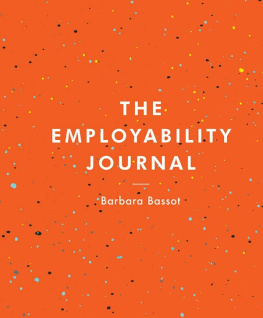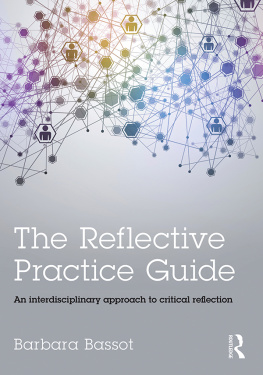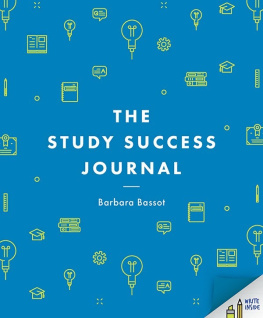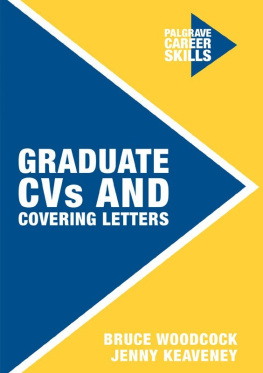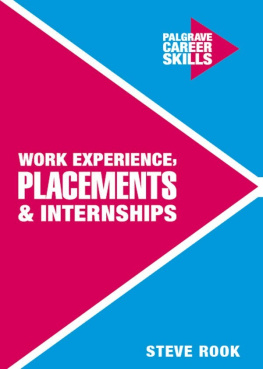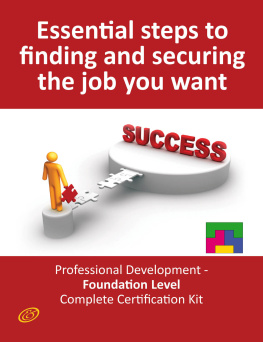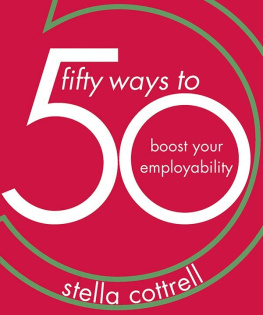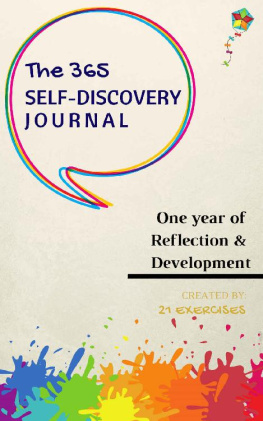The Employability Journal
Barbara Bassot

Barbara Bassot 2017
All rights reserved. No reproduction, copy or transmission of this publication may be made without written permission.
No portion of this publication may be reproduced, copied or transmitted save with written permission or in accordance with the provisions of the Copyright, Designs and Patents Act 1988, or under the terms of any licence permitting limited copying issued by the Copyright Licensing Agency, Saffron House, 610 Kirby Street, London EC1N 8TS.
Any person who does any unauthorized act in relation to this publication may be liable to criminal prosecution and civil claims for damages.
The author has asserted her right to be identified as the author of this work in accordance with the Copyright, Designs and Patents Act 1988.
First published 2017 by
PALGRAVE
Palgrave in the UK is an imprint of Macmillan Publishers Limited, registered in England, company number 785998, of 4 Crinan Street, London, N1 9XW.
Palgrave and Macmillan are registered trademarks in the United States, the United Kingdom, Europe and other countries.
ISBN: 9781137603814 paperback
This book is printed on paper suitable for recycling and made from fully managed and sustained forest sources. Logging, pulping and manufacturing processes are expected to conform to the environmental regulations of the country of origin.
A catalogue record for this book is available from the British Library.
A catalog record for this book is available from the Library of Congress.
List of Figures
Acknowledgements
I would like to express my sincere thanks to my family and friends for their tireless support in the process of bringing The Employability Journal to fruition. In particular I would like to thank Martin Bassot for his careful work on the diagrams and Marc Bassot for his proofreading and constructive comments. I would like to thank all the students who gave me permission to include their quotes, which are included in boxes in the text. These have inspired me and I am sure will inspire others. I would also like to thank my clients who I have worked with, whose stories and experiences have enabled me to write this book; some of them have become case studies or aspects of them. I would also like to thank my Commissioning Editor, Helen Caunce, for her belief in the project, and to the publisher for being prepared to take a risk with another new type of publication.
The author and publishers would like to thank the following publishers and organisations for permission to reproduce copyright material: Taylor and Francis for on page x.
Introduction
Welcome to The Employability Journal. Whatever your current programme of study, you will be concerned about what your future has in store for you when you graduate. In the past it is fair to say that a degree could be seen as a passport to a good job. When the number of people graduating from universities was smaller, simply having a degree could single you out in the eyes of an employer. Equally, graduates could expect a job at a certain level with a good salary, a so-called graduate job. With increasing numbers of people gaining university degrees, this is no longer the case and it is now widely recognised that graduates need more than just their degree; they also need some form of work experience. This can be summed up in a phrase that you have probably heard already: a degree is not enough.
However, getting experience is not the only important thing as, sadly, not all experience is good experience. In addition, it is very easy to go into a placement or an internship and to be very unclear about what you want to gain from it, missing learning opportunities and failing to understand how you can use the whole experience to inform your career decisions. This book is written for all university students and is designed to help you to reflect on your experience and thereby to enhance your career and professional development.
The whole concept of career can be very difficult to grasp.
The Career Learning and Development Bridge
In my own work (Bassot, 2009; Barnes, Bassot and Chant, 2011; Bassot, Barnes and Chant, 2014) I have developed the model of the Career Learning and Development (CLD) Bridge as a way of explaining the abstract concept of career, and career development in more detail (see illustrates the tensions that many people experience between what they want as individuals and what is available to them in their context. The metaphor of the suspension bridge harnesses these tensions, and indeed relies on them in order to function effectively. This shows that in relation to career, these tensions can be seen as opportunities for growth rather than threats, but without denying the many challenges that they bring.
Because of constant and rapid changes in the labour market, the CLD Bridge operates with two-way traffic. This reminds us of the need to engage in continuous professional development (CPD), in order to develop ourselves and to meet the needs of our employers. Career then is something that we construct throughout our lives and not a one-off decision. To many this will be a relief, as the idea of a decision I make (or a mistake I have to live with) for the rest of my life becomes less and less the norm.
and development in the ZPD is on my next steps rather than what is far ahead in the distance. I can make progress within the ZPD by gaining useful practical experience and by having discussions with others who are more knowledgeable than I am (for example my mentor and experienced colleagues), which enables career growth.

Figure 1 The Career Learning and Development (CLD) Bridge
I will refer to aspects of the CLD Bridge where appropriate throughout The Employability Journal. This book can be used in a number of ways to enhance your career learning and development. Unlike most other academic books, this is a book that you write in and I encourage you to do so! It is something that you can put into a bag or backpack to use whenever you need it, for example while you are travelling to work, on placement or volunteering. You can work through it from start to finish, or select those topics that are the most relevant and interesting at a particular time. It is a tool to help you to reflect on your experiences, enabling you to take a deeper approach to your learning and career development by understanding more about yourself and your future.
So why should you write in this book? As a cognitive process, writing helps us to develop our understanding because it involves processing our thoughts. Neuroscience shows us that writing stimulates the reticular activating system at the base of the brain, which enables us to concentrate and focus our attention. In short, it is very difficult to write something by hand whilst doing something else and, as a result, we are much more likely to remember something we have written down. In addition, a written record is something we can go back to later. Many of us assume that we will remember things, especially when we feel they are significant at the time. But in reality, we can even forget things that we were sure we would remember at the time, particularly when our daily lives are busy. This can also happen during those times when lots of things are new to us, for example whilst on placement.
Bearing in mind that a degree no longer guarantees anyone a job, making yourself as employable as possible is important. This involves presenting yourself in the best possible light to people who might become your future employers. However, before you can do that, you need to be as clear as you can about the kind of work you would like to do after graduation; reaching this point can in itself be a difficult and daunting task for a number of reasons. Here are some of them and you may be able to think of more.
Next page
